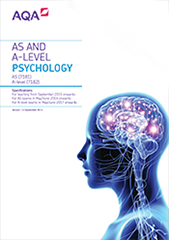3.1 Introductory topics in Psychology
Students will be expected to:
- demonstrate knowledge and understanding of psychological concepts, theories, research studies, research methods and ethical issues in relation to the specified Paper 1 content
- apply psychological knowledge and understanding of the specified Paper 1 content in a range of contexts
- analyse, interpret and evaluate psychological concepts, theories, research studies and research methods in relation to the specified Paper 1 content
- evaluate therapies and treatments including in terms of their appropriateness and effectiveness.
Knowledge and understanding of research methods, practical research skills and mathematical skills (see Annex: Mathematical requirements and exemplifications) will be assessed in Paper 1. These skills should be developed through study of the specification content and through ethical practical research activities, involving:
- designing research
- conducting research
- analysing and interpreting data.
In carrying out practical research activities, students will manage associated risks and use information and communication technology (ICT).
Social influence
- Types of conformity: internalisation, identification and compliance. Explanations for conformity: informational social influence and normative social influence, and variables affecting conformity including group size, unanimity and task difficulty as investigated by Asch.
- Conformity to social roles as investigated by Zimbardo.
- Explanations for obedience: agentic state and legitimacy of authority, and situational variables affecting obedience including proximity and location, as investigated by Milgram, and uniform. Dispositional explanation for obedience: the Authoritarian Personality.
- Explanations of resistance to social influence, including social support and locus of control.
- Minority influence including reference to consistency, commitment and flexibility.
- The role of social influence processes in social change.
Memory
- The multi-store model of memory: sensory register, short-term memory and long-term memory. Features of each store: coding, capacity and duration.
- Types of long-term memory: episodic, semantic, procedural.
- The working memory model: central executive, phonological loop, visuo-spatial sketchpad and episodic buffer. Features of the model: coding and capacity.
- Explanations for forgetting: proactive and retroactive interference and retrieval failure due to absence of cues.
- Factors affecting the accuracy of eyewitness testimony: misleading information, including leading questions and post-event discussion; anxiety.
- Improving the accuracy of eyewitness testimony, including the use of the cognitive interview.
Attachment
- Caregiver-infant interactions in humans: reciprocity and interactional synchrony. Stages of attachment identified by Schaffer. Multiple attachments and the role of the father.
- Animal studies of attachment: Lorenz and Harlow.
- Explanations of attachment: learning theory and Bowlby’s monotropic theory. The concepts of a critical period and an internal working model.
- Ainsworth’s ‘Strange Situation’. Types of attachment: secure, insecure-avoidant and insecure-resistant. Cultural variations in attachment, including van Ijzendoorn.
- Bowlby’s theory of maternal deprivation. Romanian orphan studies: effects of institutionalisation.
- The influence of early attachment on childhood and adult relationships, including the role of an internal working model.
